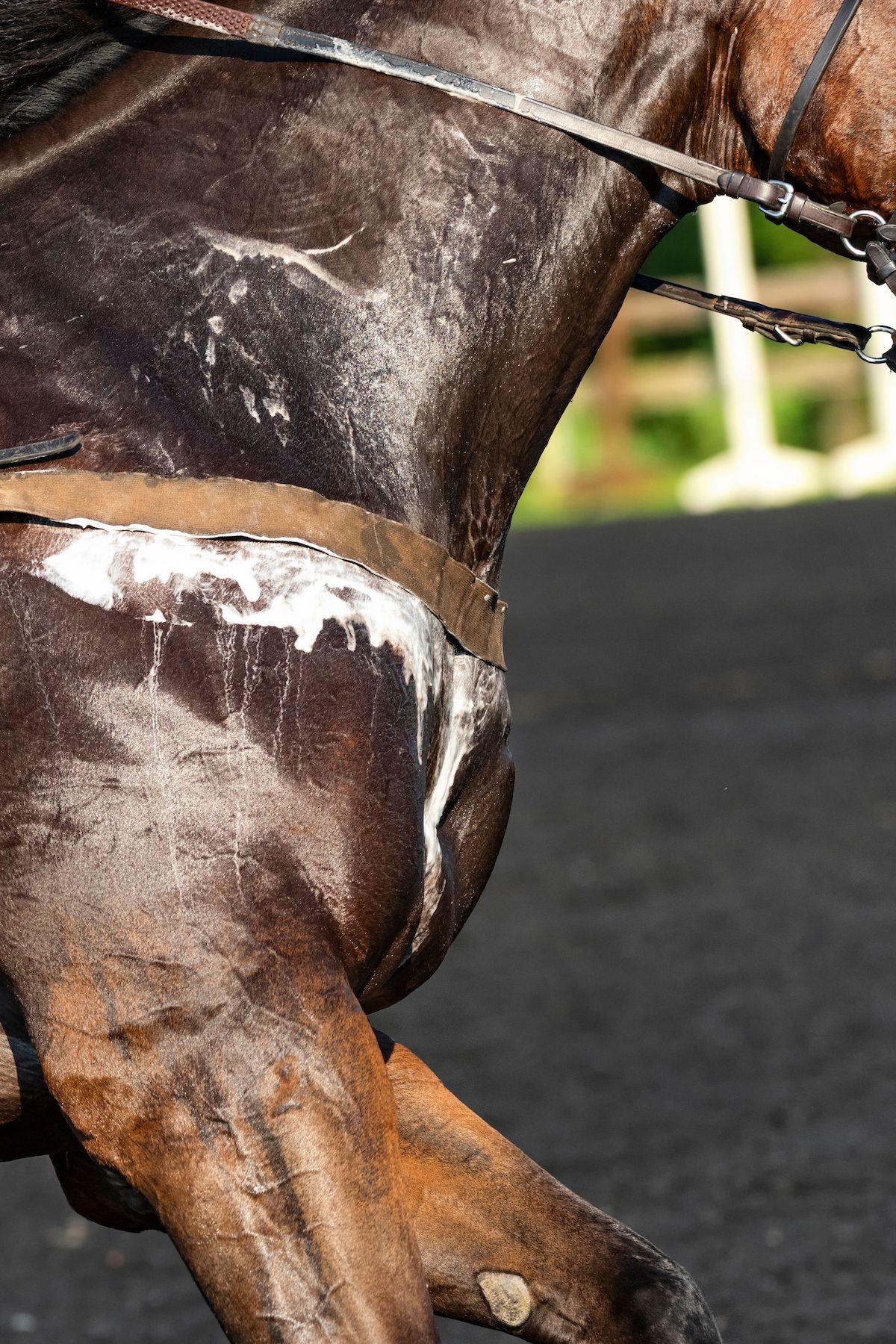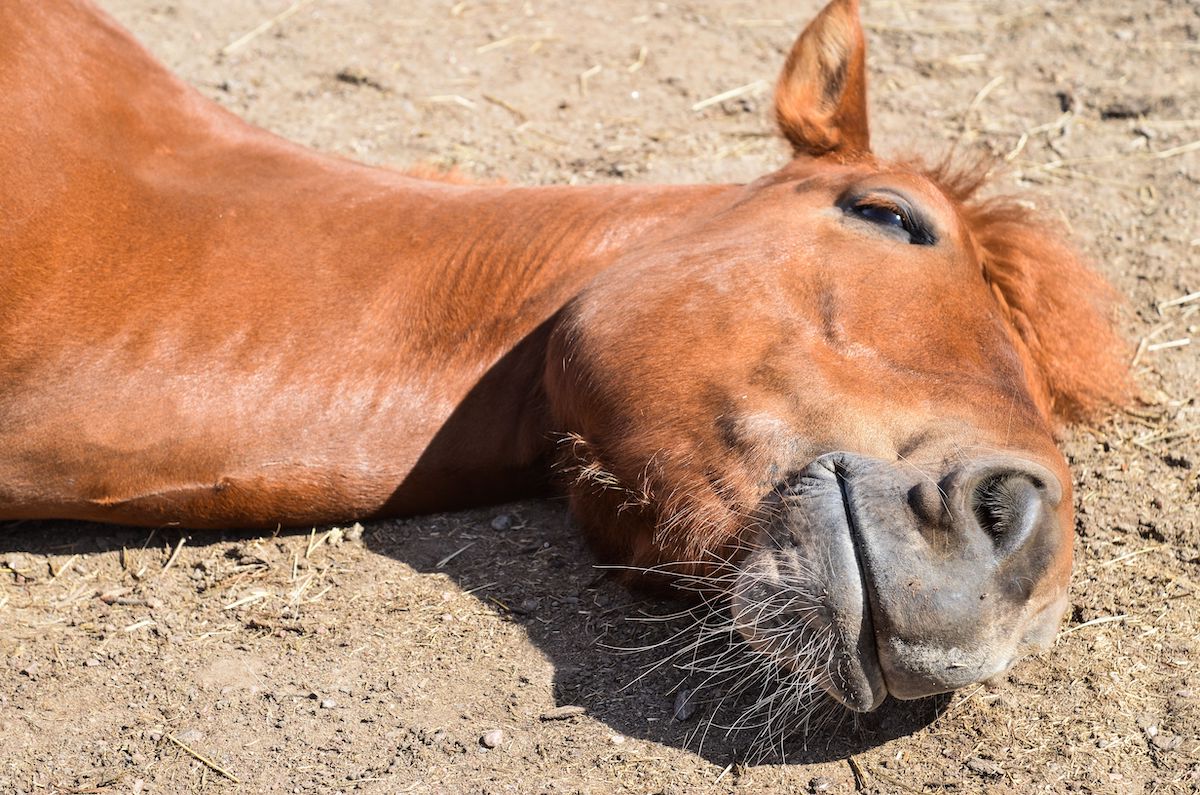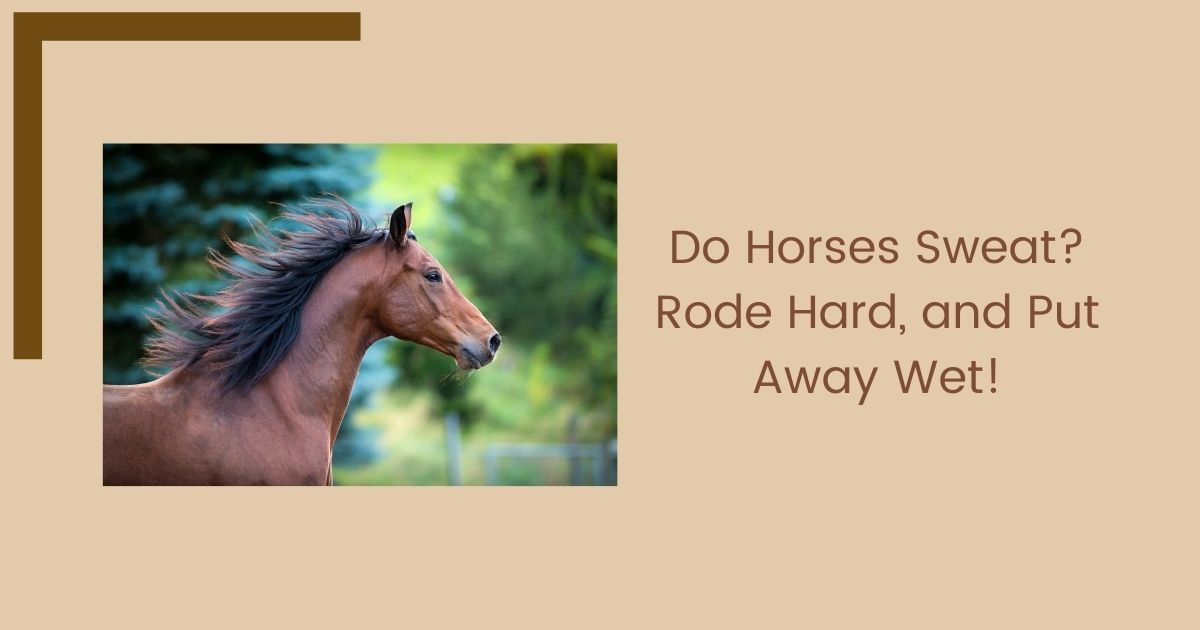Do Horses Have Sweat Glands?
You may be wondering, do horses sweat? Yes. But, how do they sweat? Horses have sweat glands just like human beings. Sweating is an essential process in a horse’s body as it cools the body from heat. Horses sweat during exercises, when ill or in pain, and under duress. Some horses also sweat when they panic.
How Do Horses Perspire? 5 Things You Didn’t Know.
As a horse owner, you need to understand some basic facts about horses. Below are some of the facts:
The purpose of sweating is to cool their bodies
The only way that a horse will reduce heat is through sweating. Horse sweat comprises three-fourths of its metabolic heat. The sweating depends on the kind of weather. In hot and humid climates, horse skin loses moisture via evaporation into the air, hence impairing the cooling mechanism.
A horse may lose up to 12% of its body weight and over 10 gallons of sweat in a day. When the temperatures are too high, a horse will sweat to regulate its body. Read our article and find out the 6 Best Weight Gain Supplements for Horses.
A lot of sweating can be harmful
Excessive sweating in horses can be dangerous. The reason is, it can lead to dehydration. Therefore, observe your horse cautiously to see when they sweat. Take note of whether your horse sweats during exercise or any other time. Also, check whether they sweat on specific areas of their bodies or all over.
Check your horse’s heart rate before and after exercise and after rest as well. Give this information to your veterinarian, who will then diagnose the cause of excessive sweating.
Horses need to sweat
There is a condition called anhidrosis which is whereby a horse doesn’t sweat normally. If your horse is not treated, it may end up dying or face dire consequences. Seek the help of your vet if you notice abnormal sweating.
Horses that don’t sweat could have heatstroke
Heatstroke is common in horses that are in stables and hot, moist climates. Horses that don’t sweat may not be active and also demonstrate unusual signs. If a horse does not sweat, it won’t be able to cool itself. As a result, the body heats too much and causes rapid breathing, hair loss, and depression. In the end, it may cause heatstroke or, worse, hyperthermia.
Horses lather when they work hard
Horses sweat at different rates. In some instances, you will notice white substances on a horse’s skin. These substances are called lather that occurs after overworking a horse. However, some horses produce lather with minimal effort.
When lathering, the proteins in horses’ sweat function as a surfactant (the chemical that reduces friction between surfaces)—the protein lathers allow the sweat to cool the skin’s surface.

Horse Sweat Explained
Below are some of the things that happen during sweating:
- Blood that is circulating absorbs heat from the muscles. It then transports it to the lungs where heat disperses; some the horse exhales, and the other the horse sweats from the skin.
- If a horse produces more heat than it can get rid of, the temperature rises through breathing or radiant cooling.
- The hypothalamus in the horse’s brain senses an increase in temperature. It then sends signals to the sweat glands to release the heat through sweat.
- Sweat glands pump out sweat that is mostly in water form or electrolytes (dissolved minerals). Horse sweat is full of electrolytes compared to human sweat.
- Sweat evaporates, carrying away heat from the skin hence reducing temperature.
- Horses sweat more during hard work and in hot weather. Sweating may go unnoticed, especially during hot and dry days; it evaporates immediately as it forms. However, unlike humans, a horse doesn’t get thirsty as soon as it sweats. Reason being that it has a higher concentration of electrolytes meaning that it develops an electrolyte imbalance at a slower pace.
How to Keep Your Horse Cool When Sweating
There are quite some reasons why horses sweat; hot weather, exercises, or physical conditions. Apart from adapting to the weather conditions, the points below will help prevent overheating:
- Reduce the number of exercise in hot weather. Be attentive to the Heat Index (a measure that combines relative humidity and air temperature to assess how hot it is).
- Let the horse drink water. For instance, at a race, give it water every hour. Please don’t wait for it to return to the trailer. Arrange for trail rides near streams or watering spots. A hydration loss of 3% can lead to underperformance in your horse.
- Be aware of the body posture, relaxation of muscles, appetite for eating, and the general attitude. These will help you know whether your horse is experiencing heat problems.
The 5 Danger Signs of an Equine Overheating
If your horse fails to regulate body temperature, it may overheat. In the end, dehydration can cause damage to organs. Look out for the following signs:
Breathing hard
After exercise, a horse may breathe rapidly but, after some time, it should go back to normal. Take note of when the breathing stays at a high rate. It may be breathing hard to cool down after overheating.
Temperatures stay high
A horse’s temperature needs to go down after working. If after 20-30 minutes it doesn’t drop, seek the help of a vet.
The horse looks tired and depressed
In this case, your horse may refuse to eat. Most of the time, horses will turn away food when they are severely dehydrated.

Lack of elasticity in horse’s skin
You will know this by pinching a fold of skin at the mid-neck, low on the shoulder, and high in the shoulder. For an appropriately hydrated horse, the skin will snap back quickly. If not hydrated, the skin will remain folded for a few seconds and eventually flatten.
Quiet gut
Use a stethoscope or place your ear on the horse’s flank. A hydrated horse will have noises of bubbles and gurgles. The horse’s intestines hold water that is used for reserves. No noises indicate dehydration and a danger to the horse. Digestion problems may also occur in cases of dehydration.
When Should I Give My Horse Electrolytes?
You should not give electrolytes to your horse just because it is overheating. Instead, only administer electrolytes if your horse has the following conditions:
- Check on the sides, neck, and chest when your horse has sweated a lot after working hard. Then, get back the lost electrolytes by administering a single dose of electrolytes.
- You may give your horse a dose of electrolytes the night before a show. This will make up for the loss that may occur as a result of the stress of transport. Also, it may trigger thirst, hence drinking water before the competition. Note that you should not give many electrolytes to your horse; it will end up removing the excess.
- If your horse isn’t drinking much, give electrolytes to trigger thirst. Horses that get good forage and salt drink a lot.
- Before the start of a race and during competitions, give electrolytes to prevent dehydration.
You can administer electrolytes in paste form, mix in feed, dissolve in water or orally. Follow the instructions on the package to give the correct quantity.

Why is My Horse Not Sweating?
A horse not sweating is a red flag! No one knows the exact causes of anhidrosis; some associate it with exercise stress, hereditary or metabolic factors. The most important thing is identifying it. Here are signs to look out for:
- Labored breathing during or after an exercise– a horse will struggle to breathe even after practice ends. It may even breathe harder when resting.
- Poor coat– you will notice a loss of hair on the body or face. This could be an early symptom of anhidrosis. Also, your horse will tend to have dry skin all over or a little between its hind legs and under its tack.
- A poor performance– a horse will be quickly exhausted when working or even refuse to work.
When is Sweating NOT Normal for an Equine?
As much as sweating is good for an equine, there are instances when it is not normal. For example, excessive sweating may be a sign of underlying conditions like medical conditions. If your horse is sweating excessively, inform a vet who will rule out the actual cause.
Last Words
Sweat is vital when it comes to cooling in horses. For you to be a good horse owner, understand how and why your horse is sweating. Be cautious to ensure they are not sweating too much or excessively. Don’t let your horse get heatstroke!
